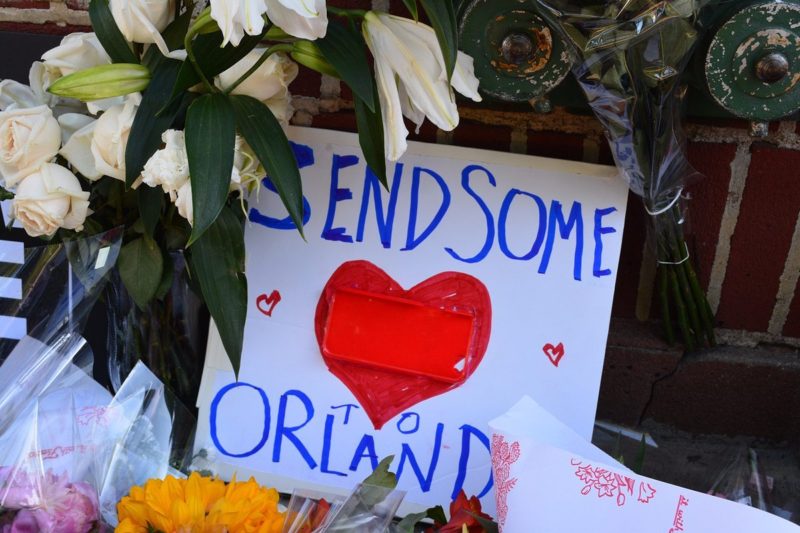Family Members and Undocumented Survivors of Orlando Shooting Eligible for U Visas
"The individuals and their families impacted by this horrific tragedy aren’t getting any special treatment or cutting the line," said Immigration Equality Client Programs Director Pamela Denzer, "they are eligible for something that was already established many years ago.”

In the hours after the shooting at an Orlando, Florida, gay nightclub that would leave 49 people dead and more than 50 injured, information emerged that almost all of the victims lived at the intersection of being Latino and LGBTQ-identified. In the days since, it’s become clear that one of the deadliest mass shootings in the United States has also taken its toll on Orlando’s immigrant community.
The victims came from all over, including South Africa and the Dominican Republic, and Fusion was able to confirm that two survivors of Sunday’s shooting are undocumented. A third undocumented man, a 31-year-old from Mexico, was also killed during the attack.
Survivors as well as the spouses, partners, or close relatives of those killed in the attack could qualify for U visas, which, according to U.S. Citizenship and Immigration Services, are “set aside for victims of certain crimes who have suffered mental or physical abuse and are helpful to law enforcement or government officials in the investigation or prosecution of criminal activity.” After three years and if certain requirements are met, U-visa holders become eligible to adjust their status and become lawful permanent residents.
Immigration Equality, an immigrant rights organization based in New York that provides assistance to LGBTQ and HIV-positive communities, is currently offering to help those affected by the massacre apply for U visas. Through its national hotline, the organization is offering help accessing attorneys, filing the proper paperwork, and addressing any language barriers.
Its client programs director, Pamela Denzer, told Rewire that like many others, her organization became aware of how hard-hit immigrant communities were by the attack thanks to news reports. But before long, survivors, friends, and family members of victims were contacting the immigrant rights organization inquiring about the services available, and what the organization could do on behalf of undocumented families affected by the tragedy.
Denzer told Rewire both immigrant and undocumented victims and their families have benefits available to them other than U visas. Immigration Equality is currently offering victims’ families assistance filing the various forms required for a visa or humanitarian parole, as well as assisting those who speak English as a second language to provide a detailed explanation and evidence of their circumstances, as is required.
“Parents or family members of victims who don’t live in the country and who want to see their child or attend their funeral, might need help getting a visa or getting humanitarian parole. If their child passed away or is critically injured, they need to be with them, and we can help with that,” Denzer said.
This was the case for the mother of 26-year-old Oscar Aracena-Montero, who moved to Florida from the Dominican Republic when he was a child. He was killed in Sunday’s attack, and in the days since, his image has circulated on social media in the hope that someone “who can help” would see the plea and assist his mother in obtaining a visa so she could attend Aracena-Montero’s funeral. The Dominican Republic-based newspaper Listin Diario has since reported that Aracena-Montero’s mother was able to obtain a visa, but now needs assistance ensuring Aracena-Montero’s siblings in the Dominican Republic are also able to attend his funeral.
As Fusion reported, immigration status is creating additional challenges for survivors of Sunday’s attack and for the families of those who lost their lives. There is uncertainty about whether they qualify for state and federal assistance programs that would assist with hospital care.
Over the years, as the number of undocumented people in the United States has risen, many states have attempted to narrow the definition of “emergency” as a way of limiting what hospitals will cover for undocumented patients. PBS reported that in 2012, “Florida changed its policy to pay for emergency services for eligible undocumented immigrants only until their conditions had been ‘stabilized.’ Previously, its policy was to pay for care that was ‘medically necessary to relieve or eliminate the emergency medical condition.’”
Immigrant families were also not prepared for the costs of burying their loved ones, many of whom were only in their 20s and 30s. That process would require repatriating and burying their bodies in their countries of origin. The family of the undocumented man from Mexico who was killed in Sunday’s attack told Fusion that it would cost them up to $6,000.
Many of these families are turning to online fundraisers to help with the costs of medical care or funerals. The family of victim Eric Ortiz has created an online fundraiser to help pay for the costs of cremation and spreading Ortiz’s ashes in his native Puerto Rico.
Those showing support online for the undocumented victims of Sunday’s shooting and spreading information about the possibility of U visas for survivors and family members are already fielding negative responses from anti-immigrant social media users, who are comparing the Orlando shooting to “winning the lottery,” and claiming that victims are benefiting from a tragedy.
The U-visa program has existed since 2000, and Denzel said there is nothing that “uniquely qualifies” victims of this shooting for this visa.
“There are a wide range of scenarios that make a person qualified for this, from being kidnapped to experiencing the murder of a loved one. If a person survived this tragedy, it entitles them to a U visa because they are not a citizen and they experienced a violent crime,” Denzel told Rewire. “We’re not doing anything we don’t already do; we’re not creating services that didn’t already exist. This isn’t a special project. The individuals and their families impacted by this horrific tragedy aren’t getting any special treatment or cutting the line; they are eligible for something that was already established many years ago.”

